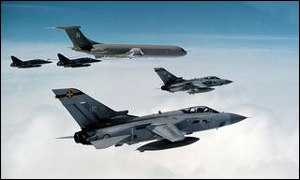| You are in: Business | ||||||||||||||||||||||||||||||||||||||||||||||||||||||||||||||||||||||||||||||||||||||||||||||||||||||||||||||||||||||||||||||||||||||||||||||||||||||||||||||
|
Monday, 3 December, 2001, 16:30 GMT
Privately financing war

Replacing the VC10 tankers is the biggest PFI to date
Britain's defence forces are being dramatically restructured, with large portions being effectively privatisated, through the use of the controversial private finance initiative (PFI).
In a cost cutting drive, the Ministry of Defence (MoD) has proposed PFIs for leasing planes, sharing military satellites with commercial operators, hiring hospital ships and using civilians in quasi-frontline roles.
The move has been precipitated by the severe squeeze on the defence budget which is likely to be made worse by the need to acquire expensive new equipment. "There's a lot of different ideas being tried to reduce the amount the MoD has to spend to improved its capabilities ... but it wants to buy services," said the Jane's business editor David Mullholland. The 39 deals that have brought in about £2bn in private sector investment have produced mixed results, and another 50, valued at £12bn or equivalent to about half the MoD's annual budget, are under consideration. By hiring the support services, the MoD wants to concentrate on its core "business" of waging war and peace keeping duties. Hiring and firing A series of leaked reports, like the Fleet Risk Register in June, have cast serious doubts on the armed forces capabilities. They come after Strategic Defence Review (SDR) in 1998 which demanded a rethink of equipment and services procurement and suggested hiring on an "as needed" basis. The MoD spends about £6bn of its £23bn annual budget on equipment and over £4bn on training personnel. "Our armed forced are very good, the best in Europe," said Professor Keith Hartley of York University's Centre for Defence Economics "But they're not overendowed with funding and they're planning to buy modern and expensive equipment like aircraft carriers, the Joint Stike Fighter, and the A400M heavy transport plane," all of which, he adds, will not be PFIs. To cover these costs the MoD will need to make savings in other areas, despite the £100m funding increase in the pre-Budget report. Job causalties "You may only need equipment and personnel for three months a year, but also need to have it as and when (operations arise), and under PFI we can choose," said a MoD spokesman. In 2000, there were 326,800 military and civil service personnel, mostly to keep a proportionately small number of combat personnel ready for deployment. Hiving off parts of the workforce to the private sector and then hiring in services when need is expected to dramatically cut wage and training costs. The shift was "not significant at the moment" according to the MoD spokesman but trade unions representing civil service personnel expect this to change. The privatisation of the Royal Navy's warship maintenance and support divisions in Faslane, Poutsmouth and Devonport are expected to be announced in January, with thousands of jobs due to be cut. "It was always the intention, when the MoD set up Defence Logistics unit with 38,000 civil and 11,000 military personnel as a result of the SDR, to identify where they can bring in defence contractors," said David Luxton, spokesman for Prospect, formerly the Institute of Professionals, Managers and Specialists. "The idea was to transfer the risk to a contractor and in the event of a war they would put on a uniform with special territorial status," he adds. What is needed Serco, Amey and EDS are some of the service companies already supplying the MoD with security at bases, accommodation and computer support under PFIs. In essence, the MoD does not consider itself as the best manager in these areas and is turning to outside help. Choosing a company to run a service is based on "transfer of risk to those best place to manage it", said the MoD spokesman. But next year a contract to supply tanker planes for air-to-air refuelling will take the private sector involvement to a new level. Defence contractors like BAE Systems, Rolls Royce, US companies Boeing and Brown & Root and Germany's EADS will be operating the service for the MoD. It is the closest the MoD has come to asking a company to supply what many consider a frontline operation, with the use of civilian pilots and crew being strongly considered. Targetting success Britain leads the world in PFIs, including in its defence forces, and so far there are few benchmarks against which to measure success. "It's not just about saving money but also operational ability," said the MOD spokesman. But evaluation is hampered by the limited information made public about the defence forces. "We don't have much information on operational ability but we don't know how often they can fly, ships can sail, or the availability of spare parts," said Professor Hartley. "The evidence, the very little that there is from the MoD, is that it produces cost savings of about 5% and 40%," he adds. As in PFIs the education system and the NHS, there have so far been some successes but also a few dramatic failures. The general feeling by analysts is that it is to early to tell. "I don't know yet, I'm somewhat sceptical because essentially I'm not sure it will be cheaper," said Mr Mullholland.
|
Internet links:
The BBC is not responsible for the content of external internet sites Top Business stories now:
Links to more Business stories are at the foot of the page.
|
||||||||||||||||||||||||||||||||||||||||||||||||||||||||||||||||||||||||||||||||||||||||||||||||||||||||||||||||||||||||||||||||||||||||||||||||||||||||||||
|
Links to more Business stories |
 |
||
| ----------------------------------------------------------------------------------
To BBC Sport>> | To BBC Weather>> | To BBC World Service>> ---------------------------------------------------------------------------------- © MMIII | News Sources | Privacy |